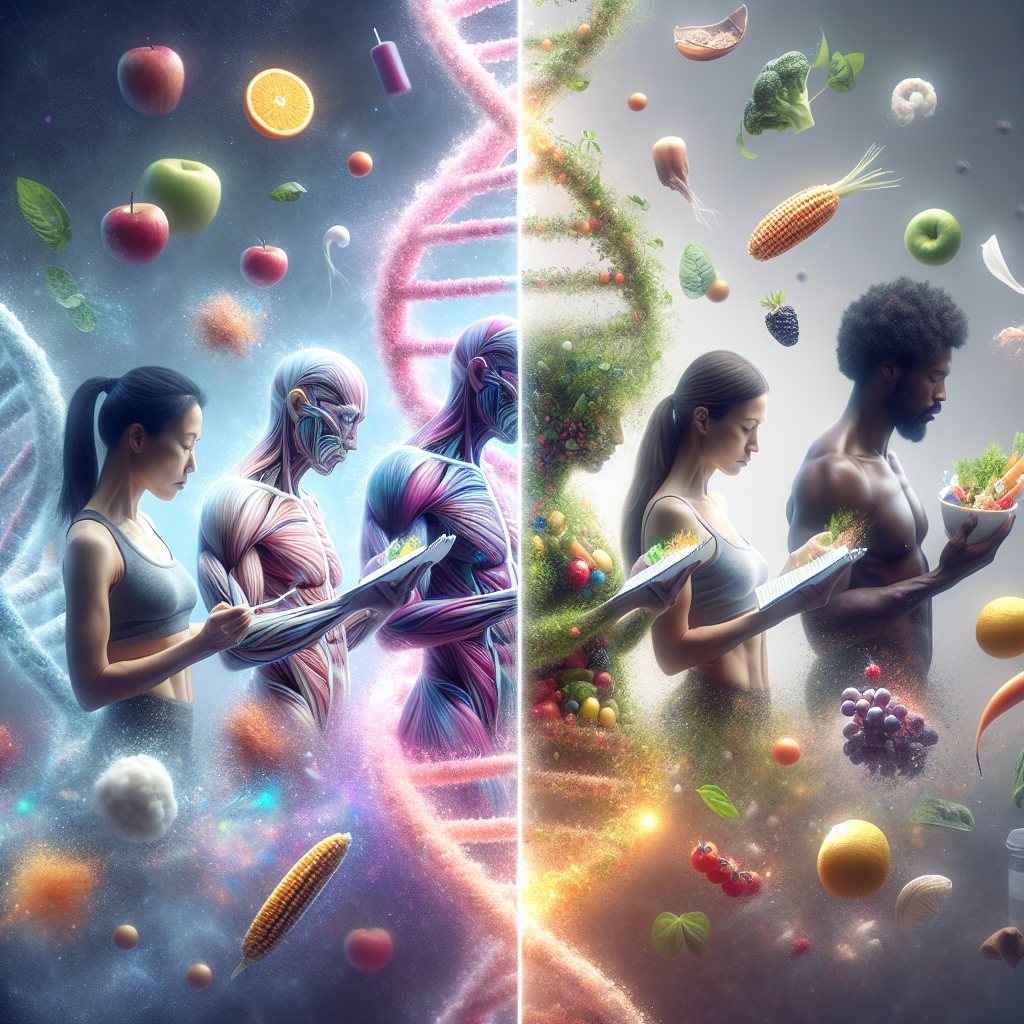Have you ever tried a popular diet that worked wonders for your friend but left you feeling tired, hungry, and no closer to your health goals? You’re not alone. The world of nutrition is filled with buzzy eating plans promising miraculous results, yet most people find themselves cycling through diet after diet without lasting success.
The problem isn’t your willpower. It’s that one-size-fits-all approaches to nutrition and diet therapy simply don’t work for everyone. Our bodies are as unique as our fingerprints, with different genetic makeups, lifestyles, health challenges, and even taste preferences. What nourishes one person optimally might leave another nutritionally depleted.
The good news? There’s a better way forward: personalized nutrition that respects your individuality while helping you achieve genuine wellness.
Beyond Cookie-Cutter Diets: The Promise of Personalized Nutrition
Personalized nutrition (PN) takes a fundamentally different approach to diet and health. Instead of prescribing universal rules that everyone must follow, PN creates tailored dietary recommendations based on your unique profile.
“Personalized nutrition aims to provide tailored dietary recommendations to improve a person’s health outcomes by integrating a multitude of individual factors,” explains Dr. Sarah Mitchell, a nutrition researcher. “We’re looking at genetics, blood biomarkers, gut microbiome composition, lifestyle patterns, and health conditions to create truly individualized eating plans.”
This customized approach delivers several important benefits:
- Better adherence: When a nutrition plan considers your food preferences and lifestyle realities, you’re much more likely to stick with it long-term.
- Improved outcomes: Studies show personalized nutrition leads to better results in weight management, blood sugar control, and other health markers compared to generic plans.
- Reduced frustration: No more wondering why a diet that works for others doesn’t work for you.
- Prevention potential: Tailored nutrition can help address specific risk factors before they develop into chronic conditions.
Real-world success stories are increasingly common. Take Michael, a 45-year-old who struggled with weight gain and fatigue despite trying multiple popular diets. Through personalized nutrition assessment, he discovered specific nutrient deficiencies and food sensitivities that standard diets never addressed. Within three months of following his tailored plan, his energy returned and he lost 18 pounds without feeling deprived.
The Science of Individuality in Nutrition and Diet Therapy
Effective nutrition and diet therapy must consider numerous individual factors that influence how your body processes, utilizes, and responds to food. These include:
- Age and life stage: Nutritional needs change dramatically throughout life, from growth phases to pregnancy to healthy aging.
- Gender and hormonal status: Hormonal differences significantly impact metabolism, nutrient requirements, and even how we store fat.
- Activity level: Athletes need different nutrition than office workers, and even the type of exercise matters.
- Medical history: Previous surgeries, medications, and health conditions all influence how your body processes nutrients.
- Genetic variations: Some people naturally process certain nutrients differently due to their genetic makeup.
- Gut microbiome composition: The trillions of bacteria in your digestive system affect everything from nutrient absorption to immune function.
The goal of personalized nutrition isn’t just providing adequate calories—it’s optimizing nutrient intake while respecting personal circumstances. This means ensuring you get the right balance of macronutrients (proteins, fats, carbohydrates) and micronutrients (vitamins and minerals) that your unique body needs.
“When we create truly personalized nutrition plans, we’re looking at the whole person,” says nutritionist Elena Wong. “We need to understand not just what they should eat theoretically, but what they can and will eat practically given their preferences, cultural background, cooking skills, and daily routine.”
Therapeutic Diets: Personalized Nutrition as Medicine
Perhaps nowhere is the importance of personalized nutrition more evident than in the management of chronic health conditions. Therapeutic diets tailored to specific health challenges can be powerful tools for symptom management and disease control.
For diabetes, personalized nutrition and diet therapy goes far beyond simply “cutting sugar.” A truly effective approach considers the individual’s insulin sensitivity, medication regimen, activity patterns, and even how different carbohydrate sources affect their unique blood glucose response.
According to the American Diabetes Association, MNT (Medical Nutrition Therapy) for diabetes should be individualized, focusing on the person’s specific type of diabetes, medications, personal goals, and preferences. This tailored approach has been shown to reduce HbA1c (a measure of blood sugar control) by up to 2% in type 2 diabetes—comparable to the effect of many medications.
Similarly, heart disease management requires personalized dietary strategies. While reducing saturated fat and sodium is generally beneficial, the optimal approach varies based on individual lipid profiles, blood pressure patterns, medication use, and other factors.
“A therapeutic diet isn’t just about restricting ‘bad’ foods,” explains cardiologist Dr. James Chen. “It’s about creating a sustainable, enjoyable eating pattern that addresses the specific mechanisms driving that person’s cardiovascular risk, while ensuring adequate nutrition for overall health.”
Other conditions benefiting from personalized nutrition approaches include:
- Inflammatory bowel diseases, where specific foods may trigger flare-ups in some individuals but not others
- Autoimmune conditions, which often respond to personalized anti-inflammatory dietary strategies
- Kidney disease, where precise control of protein, potassium, phosphorus, and other nutrients is crucial
- Food allergies and intolerances, requiring careful elimination and substitution strategies
Knowledge is Power: The Educational Component
A critical aspect of successful nutrition and diet therapy that’s often overlooked is education. Simply handing someone a meal plan without helping them understand the “why” behind it rarely leads to lasting change.
“Empowerment through knowledge is essential,” says dietitian Michael Rodriguez. “When people understand how specific foods affect their unique body, they make better choices even when they’re not following their plan perfectly.”
Effective nutrition education in personalized approaches includes:
- Teaching food literacy (understanding nutrition labels, ingredients, and food preparation methods)
- Explaining the connection between specific dietary choices and health outcomes
- Providing practical skills like meal planning, grocery shopping, and cooking techniques
- Helping identify and manage emotional eating triggers
- Offering strategies for navigating social situations while maintaining nutritional goals
This educational foundation transforms nutrition from a temporary “diet” into a sustainable lifestyle change—one that can evolve with you as your circumstances and needs change over time.
Targeted Applications: Cancer Prevention and Management
One exciting area where personalized nutrition is making significant impact is in cancer care. Research increasingly shows that dietary patterns can influence both cancer prevention and treatment outcomes, but the optimal approach varies based on cancer type, treatment protocols, and individual factors.
During cancer treatment, personalized nutrition helps maintain strength and address specific challenges like decreased appetite, altered taste perception, or difficulty swallowing. After treatment, tailored nutrition plans can support recovery and potentially reduce recurrence risk.
“We’re seeing promising evidence that personalized nutrition can enhance quality of life during cancer treatment and potentially improve outcomes,” notes oncology dietitian Rebecca Thompson. “For example, some patients undergo genetic testing to identify which nutritional interventions might best support their specific cancer type.”
For cancer prevention, personalized approaches consider family history, genetic risk factors, and environmental exposures to create protective dietary strategies. This might include emphasizing specific phytonutrients, optimizing vitamin D status, or modifying cooking methods to reduce carcinogen exposure.
The Behavioral Dimension: Understanding Your Relationship with Food
Even the most scientifically perfect nutrition plan fails if it doesn’t account for the complex psychological and behavioral aspects of eating. Personalized nutrition and diet therapy must address the “why” behind eating patterns.
“Many people know what they ‘should’ eat, but struggle with implementation,” explains behavioral psychologist Dr. Anna Williams. “Effective personalized nutrition addresses triggers, emotional eating, time constraints, and other barriers that prevent lasting change.”
This might include:
- Identifying emotional triggers that lead to unhealthy eating patterns
- Setting realistic, incremental goals rather than attempting dramatic overnight changes
- Using technology like apps or wearables to track progress and provide accountability
- Developing specific strategies for challenging situations like travel, social events, or high-stress periods
- Building a supportive environment at home and work
The integration of technology has been especially transformative in this area. Wearable devices can now track not just activity but also sleep patterns, stress levels, and even real-time glucose responses to meals. This data provides unprecedented insights into how your unique body responds to different foods and eating patterns.
“Mobile sensors and AI-driven platforms are revolutionizing personalized nutrition by offering real-time, non-invasive monitoring of nutritional status,” says technology researcher Dr. James Park. “This allows for much more precise and dynamic dietary recommendations than ever before.”
Challenges in Implementation: Making Personalized Nutrition Accessible
Despite its tremendous potential, several challenges remain in making truly personalized nutrition and diet therapy widely available:
- Access and affordability: Comprehensive testing (genetic, microbiome, etc.) can be expensive and isn’t always covered by insurance.
- Data integration: Synthesizing diverse data streams into actionable recommendations requires sophisticated systems.
- Practitioner training: Many healthcare providers have limited nutrition training, especially in personalized approaches.
- Adherence support: Even tailored plans require consistent implementation to be effective.
- Privacy concerns: The sensitive nature of health data requires robust protection.
However, innovations are rapidly addressing these barriers. Telehealth has expanded access to nutrition professionals, while increasingly affordable testing options make personalized assessment more accessible. Artificial intelligence is improving data integration and providing more sophisticated recommendations.
The Eastern Wisdom in Personalized Nutrition
The concept of individualized nutrition isn’t actually new. Eastern healing traditions have emphasized personalized approaches to diet for thousands of years, recognizing that different constitutional types require different nutritional strategies for optimal health.
This is where HerbalsZen’s EASTCHI AI represents a fascinating bridge between ancient wisdom and modern science. By integrating traditional Eastern medicine principles with cutting-edge artificial intelligence, EASTCHI AI creates nutrition and lifestyle recommendations that honor both your unique biological makeup and time-tested healing traditions.
The platform analyzes constitutional types through Five Element Theory, understanding that someone with a “Wood” constitution may have different nutritional needs than someone with a “Metal” constitution. It also incorporates seasonal dietary guidance, recognizing that our bodies require different support throughout the year’s cycles.
Perhaps most importantly, EASTCHI embraces the Eastern concept of food as medicine—understanding that nutrition isn’t just about calories and macronutrients, but about the energetic and healing properties of foods as they interact with your unique body.
This fusion of Eastern medical wisdom with modern technology offers a holistic approach to personalized nutrition that addresses not just physical health but emotional and energetic balance as well. Understanding your constitutional element type can provide valuable insights into creating nutritional strategies that support your unique needs.
The failure of one-size-fits-all diets isn’t a sign that nutrition doesn’t matter—it’s evidence that your individuality deserves respect. Through personalized nutrition and diet therapy approaches that honor your unique needs, preferences, and circumstances, lasting health transformation becomes not just possible, but natural.
Your body is unlike any other. Isn’t it time your nutrition plan reflected that?




